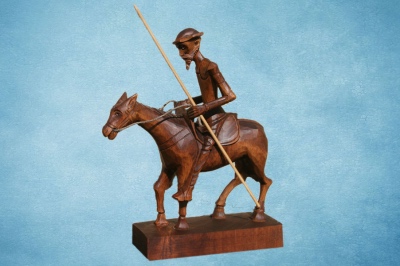Thank You, Mrs. Davis
|
I have written about memorizing prose and poetry while in high school. It was the one educational experience that I hated the most. One of my English teachers, Mrs. Davis, not only required a hundred lines per semester, but, when you would make a mistake, her expression was not what you wanted to see. I cowered while standing in front of her desk before or after school as I recited for her. Having said that, of all that I learned and remembered from four years at Mt. Lebanon High School, it is many of the lines recited a half century ago. If you doubt this, go to the tool bar and type in poetry prose, and you will find a couple dozen articles that I have written over the years about that experience. I went to Florida to visit Mrs. Davis to thank her for that hated requirement that I appreciated. She gave me two textbooks, one was the one she used in class. 
I graduated from high school in 1961; my guess is that within a year or so, she retired. However, I wish that I could still talk to her about the meaning of the lines that I memorized over a half century ago. I memorized them and thought that I got their meaning. Wrong. I missed much of the truth of those lines. In the past decade, I have danced with death twice. Those two dances, which were due to a traumatic brain injury and prostate cancer, were blessings. I woke up to living life. I wouldn't wish to relive either event, but I would never delete either from my life. Both were great blessings. Due to those two dances, I am more alive than I was back in the 60s during the civil rights movement. Therefore, here I am at 74-years old, writing, teaching, and traveling. I get up in the morning at 6:15, take care of Ginger, a four-month-old Irish Setter puppy, exercise, and begin the day. I go to bed around 11 at night. I am tired, but I am driven. The Okinawans have a term for my modus operandi, ikigai, which means "the reason you get up every day." I know that I won't live forever. Merely sitting back waiting to die is a living death. While I am aware that I won't live forever, I am living in the present. So, what are the things that are the ikigai issues in my life? My children: Scott, Kristin, Michelle, my grandchildren: Ayanna, Jack, Owen, and Ti Ti, my writing, my teaching, and my return to Burma/Myanmar to interview Daw Aung San Suu Kyi, the Lady, and see Ti Ti and her family again. There have been some additional medical issues that have caused some worry but have been resolved beyond the traumatic brain injury and prostate cancer. However, I was watching a video of Morgan Freeman and Charlie Rose. During the interview, Freeman mentioned the poem, Invictus, by William Ernest Henley, which he wrote in 1875. 
In my senior year in high school, I memorized that poem for Mrs. Davis.
It was not an easy poem to recite, but I got Henley's message. He wasn't a coward cringing in the corner of life. 
This is a drawing of Henley from Vanity Fair in 1892. However, over a half century later, I truly understand Henley's poem. Henley had to have one of his legs amputated. He had tuberculosis, which resulted in the problem with his leg. However, his doctors told him that his other leg would need to be taken. In spite of their medical diagnosis, Henley went to Dr. Joseph Lister to get another opinion. Lister did a series of operations, which saved his other leg. Interestingly, Henley was recovering from one of Lister surgical procedures when he wrote Invictus. Invictus is Latin for unconquerable, unvanquished or undefeated. While much of the poem reflected upon his medical issues, it also reflected Henley's attitude about being born into poverty. Henley had a choice in his life. He could have wallowed in his suffering or he could act. Facing death literally and figuratively, Henley resolved to live. His choice was also how people would remember him. I, too, have had life threatening medical issues. Let me share with you my choice words, which explain my drive...arrogant and defiant. Essentially, it is the same as Invictus. I won't allow medical or any other type of issues stop me. Finally, the fool on the hill, who is now called President Trump, has given me another purpose for my life. I wouldn't be able to change Donald the Dumb, but I won't stop responding to his stupidity. I, like Henley, want to live and be remembered for my work despite any issue that stands in my way. Donald the Dumb is America's fool on the hill and will be remembered as the fool. No one is immortal...not even Donald the Dumb. We are here in this world for a brief moment in time. Ask yourself, how will you be remembered when you are gone? Choose wisely. I have chosen what Henley wrote in Invictus.
This video is part of Charlie Rose's interview with Morgan Freeman in which Freeman talks about Nelson Mandela and Invictus. This is the prison on Robbin Island where Mandela lived for 27-years. The photo on the left is the hallway in which his cell was located. The photo on the right is his cell.
Visit the On Seeing the Light page to read more about this topic.
Visit the Connecting the Dots page to read more about this topic.
Visit the Darkest Before Dawn page to read more about this topic.
Visit the The Last Lecture page to read more about this topic.
Visit the Dancing with Death page to read more about this topic.
Visit the Thus Spoke Ginger page to read more about this topic.
Visit the "Don Quixote" page to read more about this topic.
Visit the Man in the Arena page to read more about this topic.
Visit The Mentors and Me page to read more about this topic.
Visit the Donald the Dumb page to read more about this topic.
Visit the Best and Worst of Times page to read more about this topic.
Visit the Burma Independence page to read more about this topic. 03/06/17 Follow @mountain_and_me |
||||||




















